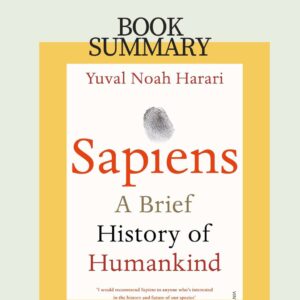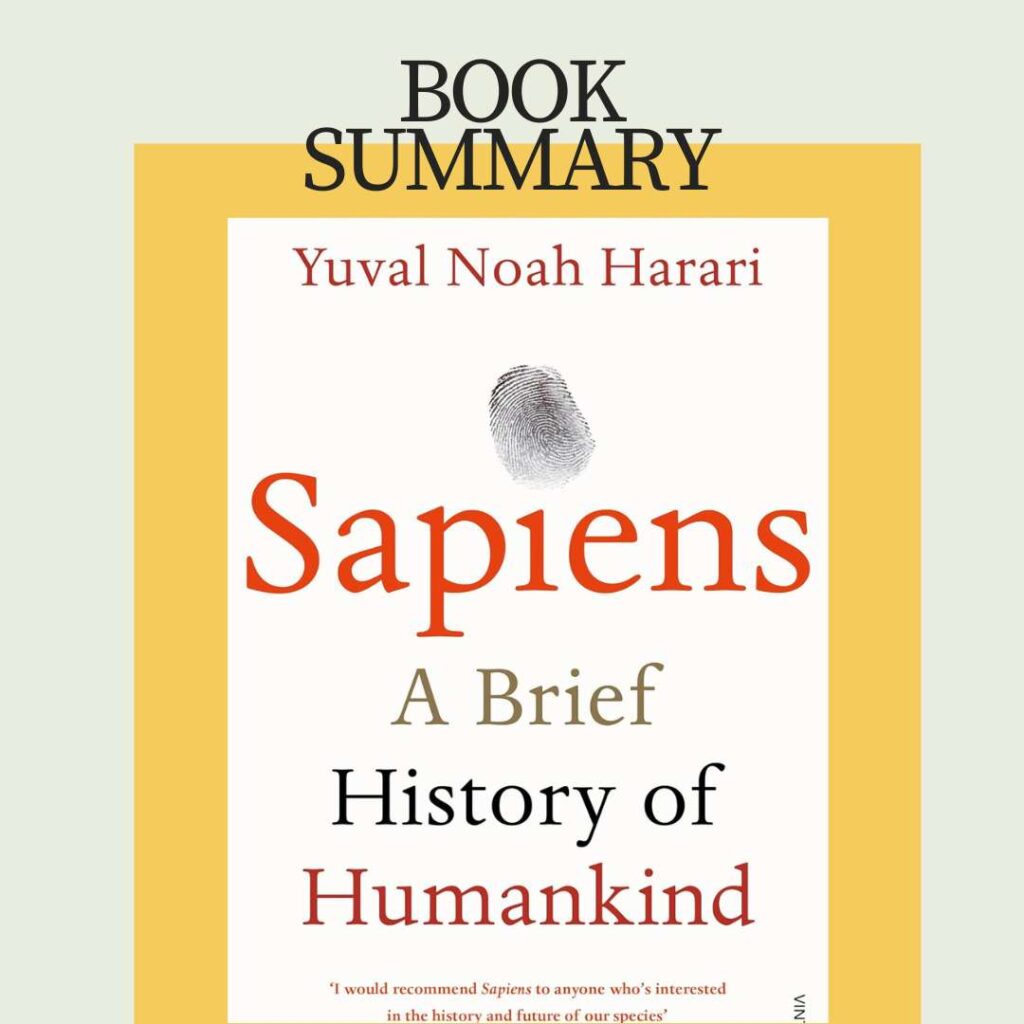Sapiens summary
In this summary, we will delve into the groundbreaking work of Sapiens by Yuval Noah Harari, focusing on the key revolutions that have shaped human history from the very dawn of our existence.
What is Sapiens?
- Sapiens is a book that explores the history of Homo Sapiens — the species to which we belong.
- It provides a comprehensive look at the major milestones in human evolution.

Table of Contents
Why it’s Relevant
- Understanding our past is vital in comprehending the present and anticipating the future.
- Sapiens offers insights into the origins and developments that led to the current state of humanity.
Brief Introduction to the Author: Yuval Noah Harari
- Yuval Noah Harari is an Israeli historian and professor at the Hebrew University of Jerusalem.
- His extensive research and thought-provoking perspectives have made him a leading voice in understanding human history.
The Cognitive Revolution
The Importance of the Cognitive Revolution
- The Cognitive Revolution marked a significant turning point in human history, leading to the emergence of modern human behavior.
- It enhanced our ability to think, communicate, and cooperate on a larger scale than any other species.
How the Cognitive Revolution Shaped Homo Sapiens
- Homo Sapiens distinguished themselves through the development of complex language and symbolic thought.
- This cognitive leap allowed them to create shared myths and beliefs, forming the basis of social structures.
Impact of the Cognitive Revolution
- The Cognitive Revolution enabled Homo Sapiens to dominate the planet, eventually outcompeting other human species like Neanderthals.
- It laid the groundwork for the cultural, political, and technological advancements that followed in human history.
The Agricultural Revolution
The Concept of the Agricultural Revolution
- The Agricultural Revolution marked the shift from hunting and gathering to settled farming communities.
- It was a monumental development that transformed human societies, economies, and environments.
The Consequences of the Agricultural Revolution
- Agricultural societies could produce surplus food, leading to population growth and specialization of labor.
- It also brought about social stratification, the establishment of permanent settlements, and the formation of complex civilizations.
The Role of the Agricultural Revolution in Human Evolution
- The Agricultural Revolution set the stage for urbanization, trade, and the rise of written language in human societies.
- It fundamentally altered the way humans interacted with nature and each other, shaping the course of history.
Delving Deeper into Sapiens: A Summary
The Unification of Mankind
The concept of unification has played a pivotal role in the history of Homo Sapiens, marking a significant shift in the trajectory of human evolution. Let’s explore how this concept has influenced the progression of mankind.
Importance of Unification in Sapiens’ History
- Social constructs such as culture, language, and shared beliefs have been instrumental in uniting diverse groups of Homo Sapiens.
- The ability to cooperate on a large scale allowed for the creation of complex societies and civilizations.
- Unification fostered the exchange of ideas, technologies, and innovations that propelled human progress.
How Unification Influenced the Progression of Mankind
- Unification led to the formation of large communities with shared identities, enabling collective action towards common goals.
- Through increased cooperation, Homo Sapiens were able to build advanced structures, develop sophisticated tools, and engage in trade and commerce.
- The unification of mankind laid the foundation for the growth of empires, the spread of knowledge, and the advancement of scientific and cultural achievements.
Origins of the Scientific Revolution in the Sapiens Framework
- The Scientific Revolution emerged as a response to the limitations of traditional knowledge systems and beliefs.
- Visionaries and thinkers challenged existing dogmas, leading to the development of empirical methods and scientific inquiry.
- The emphasis on observation, experimentation, and rationality transformed the way humans approached the natural world.
Impact of the Scientific Revolution on Human History
- Scientific discoveries revolutionized fields such as medicine, astronomy, physics, and biology, paving the way for modern advancements.
- The Scientific Revolution sparked an era of exploration and technological progress, shaping the course of global development.
- The shift towards evidence-based thinking and critical analysis empowered Homo Sapiens to unravel the mysteries of the universe and drive unprecedented innovations.
Frequently Asked Questions (FAQs) About Sapiens: A Summary
What is the main premise of Sapiens?
Sapiens delves into the history of humankind, exploring key revolutions that shaped our evolution, such as the Cognitive Revolution, Agricultural Revolution, and Scientific Revolution.
Who is the author of Sapiens and what is their background?
Sapiens is authored by Yuval Noah Harari, an Israeli historian and professor known for his insightful analysis of human history and evolution.
How does the Cognitive Revolution impact homo sapiens?
The Cognitive Revolution led to the development of complex language and social structures, enabling homo sapiens to communicate and cooperate on a larger scale.
What are some consequences of the Agricultural Revolution?
The Agricultural Revolution led to settled communities, division of labor, and the rise of complex societies, transforming human life from hunter-gatherer to agricultural-based civilizations.
How did the Unification of Mankind influence human history?
The unification of mankind through shared belief systems and social constructs facilitated better collaboration, leading to advancements in trade, technology, and cultural exchange.
What role did the Scientific Revolution play in shaping modern society?
The Scientific Revolution marked a shift towards evidence-based inquiry, leading to advancements in technology, medicine, and our understanding of the natural world.
Conclusion:
In summary, Sapiens offers a thought-provoking journey through the key revolutions that have shaped human history. From the Cognitive Revolution’s impact on our cognitive abilities to the Agricultural Revolution’s influence on societal structures, and the Scientific Revolution’s role in modern advancements, each phase highlights the remarkable evolution of homo sapiens. By understanding the lessons from Sapiens, we gain valuable insights into the transformative power of history and the profound impact it has had on shaping the world we live in today.
Discover marketing services, interviews & publishing tools at SharingStories.


